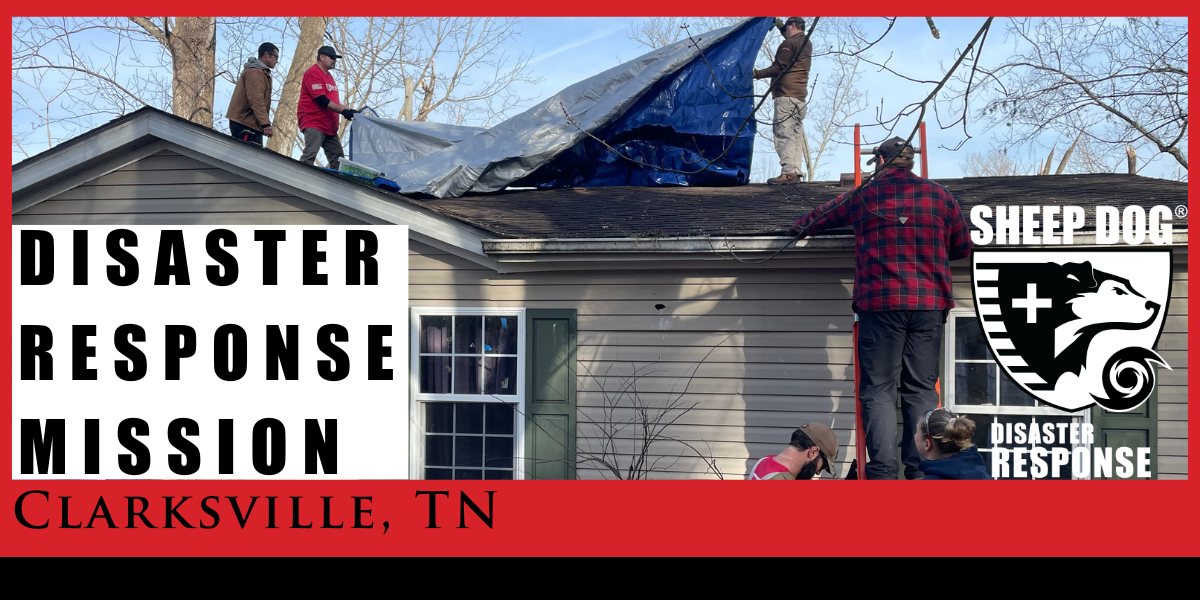Continued Service Opportunities
SDIA’s foundation and ongoing commitment to Continued Service revolve around disaster response, serving as a primary avenue for our Get Off The Couch® programming. These missions, a key component of our volunteerism, empower our Sheep Dogs to consistently contribute to their communities and country in times of need.
Disaster Response Mission
The Sheep Dog Impact Assistance Disaster Response team is on the ground in Clarksville, TN assisting residents in the aftermath of last weekend's tornadoes.
All donations go to help replenish supplies and provide fuel for chainsaws and vehicles as our team remains in Tennessee.
...
What to do During a Winter Storm
What to do During a Winter Storm
Guidelines
Listen to your radio, television, or NOAA Weather Radio for weather reports and emergency information. Eat regularly and drink ample fluids, but avoid caffeine and alcohol. Conserve fuel, if necessary, by keeping your residence cooler than normal. Temporarily close off heat to some rooms. If the pipes freeze, remove any insulation or layers of newspapers and wrap pipes in rags. Completely open all faucets and pour hot water over the pipes, starting where they were most exposed to the cold (or where the cold was most likely to penetrate). Maintain ventilation when using kerosene heaters to avoid build-up of toxic fumes. Refuel kerosene heaters outside and keep them at least three feet from flammable objects.
If you are outdoors
Avoid overexertion when shoveling snow. Overexertion can bring on a heart attack—a major cause of death in the winter. If you must shovel snow, stretch before going outside. Cover your mouth. Protect your lungs from extremely cold air by covering your mouth when...
What to do Before a Winter Storm
What to do Before Winter Storms and Extreme Cold Add the following supplies to your disaster supplies kit:
Rock salt to melt ice on walkways Sand to improve traction Snow shovels and other snow removal equipment.
Prepare your home and family
Prepare for possible isolation in your home by having sufficient heating fuel; regular fuel sources may be cut off. For example, store a good supply of dry, seasoned wood for your fireplace or wood-burning stove. Winterize your home to extend the life of your fuel supply by insulating walls and attics, caulking and weather-stripping doors and windows, and installing storm windows or covering windows with plastic. Winterize your house, barn, shed or any other structure that may provide shelter for your family, neighbors, livestock or equipment. Clear rain gutters; repair roof leaks and cut away tree branches that could fall on a house or other structure during a storm. Insulate pipes with insulation or newspapers and plastic and allow faucets to drip a little during cold weather to avoid...
What to do Before a Tornado
What to do Before a Tornado Be alert to changing weather conditions.
Listen to NOAA Weather Radio or to commercial radio or television newscasts for the latest information. Look for approaching storms. Look for the following danger signs: -Dark, often greenish sky -Large hail -A large, dark, low-lying cloud (particularly if rotating) -Loud roar, similar to a freight train.
If you see approaching storms or any of the danger signs, be prepared to take shelter immediately. // ...
Tornado Information
Tornado Information Tornadoes are nature’s most violent storms. Spawned from powerful thunderstorms, tornadoes can cause fatalities and devastate a neighborhood in seconds. A tornado appears as a rotating, funnel-shaped cloud that extends from a thunderstorm to the ground with whirling winds that can reach 300 miles per hour. Damage paths can be in excess of one mile wide and 50 miles long. Every state is at some risk from this hazard. Some tornadoes are clearly visible, while rain or nearby low-hanging clouds obscure others. Occasionally, tornadoes develop so rapidly that little, if any, advance warning is possible. Before a tornado hits, the wind may die down and the air may become very still. A cloud of debris can mark the location of a tornado even if a funnel is not visible. Tornadoes generally occur near the trailing edge of a thunderstorm. It is not uncommon to see clear, sunlit skies behind a tornado. The following are facts about tornadoes:
They may strike quickly, with little or...
Chemical Threats
Chemical Threats Chemical agents are poisonous vapors, aerosols, liquids, and solids that have toxic effects on people, animals, or plants. They can be released by bombs or sprayed from aircraft, boats, and vehicles. They can be used as a liquid to create a hazard to people and the environment. Some chemical agents may be odorless and tasteless. They can have an immediate effect (a few seconds to a few minutes) or a delayed effect (2 to 48 hours). While potentially lethal, chemical agents are difficult to deliver in lethal concentrations. Outdoors, the agents often dissipate rapidly. Chemical agents also are difficult to produce. A chemical attack could come without warning. Signs of a chemical release include people having difficulty breathing; experiencing eye irritation; losing coordination; becoming nauseated; or having a burning sensation in the nose, throat, and lungs. Also, the presence of many dead insects or birds may indicate a chemical agent release. // ...
Nuclear Blast
Nuclear Blast A nuclear blast is an explosion with intense light and heat, a damaging pressure wave, and widespread radioactive material that can contaminate the air, water, and ground surfaces for miles around. A nuclear device can range from a weapon carried by an intercontinental missile launched by a hostile nation or terrorist organization, to a small portable nuclear devise transported by an individual. All nuclear devices cause deadly effects when exploded, including blinding light, intense heat (thermal radiation), initial nuclear radiation, blast, fires started by the heat pulse, and secondary fires caused by the destruction. Hazards of Nuclear Devices The extent, nature, and arrival time of these hazards are difficult to predict. The geographical dispersion of hazard effects will be defined by the following:
Size of the device. A more powerful bomb will produce more distant effects.
Height above the ground the device was detonated. This will determine the extent of blast effects.
Nature of the surface beneath the explosion. Some materials are more likely to...
General Information about Terrorism
General Information About Terrorism Terrorism is the use of force or violence against persons or property in violation of the criminal laws of the United States for purposes of intimidation, coercion, or ransom. Terrorists often use threats to:
Create fear among the public. Try to convince citizens that their government is powerless to prevent terrorism. Get immediate publicity for their causes.
Acts of terrorism include threats of terrorism; assassinations; kidnappings; hijackings; bomb scares and bombings; cyber attacks (computer-based); and the use of chemical, biological, nuclear and radiological weapons. High-risk targets for acts of terrorism include military and civilian government facilities, international airports, large cities, and high-profile landmarks. Terrorists might also target large public gatherings, water and food supplies, utilities, and corporate centers. Further, terrorists are capable of spreading fear by sending explosives or chemical and biological agents through the mail. Within the immediate area of a terrorist event, you would need to rely on police, fire, and other officials for instructions. However, you can prepare in much the same...
Have Information on Disaster Preparedness
Have Information on Disaster Preparedness Some of the things you can do to prepare for the unexpected, such as making an emergency supply kit and developing a family communications plan, are the same for both a natural or man-made emergency. However, there are important differences among potential emergencies that will impact the decisions you make and the actions you take. Learn more about the potential emergencies that could happen where you live and the appropriate way to respond to them. In addition, learn about the emergency plans that have been established in your area by your state and local government. Emergency preparedness is no longer the sole concern of earthquake prone Californians and those who live in the part of the country known as “Tornado Alley.” For Americans, preparedness must now account for man-made disasters as well as natural ones. Knowing what to do during an emergency is an important part of being prepared and may make all the difference when seconds count. Visit and review...

